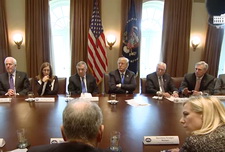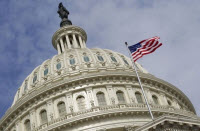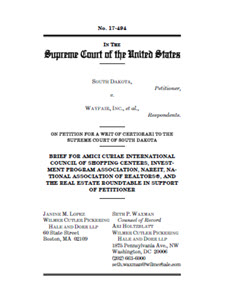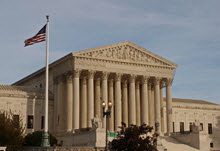House Republicans this week said efforts on a two-year budget deal to fund government programs and agencies are progressing as the current, short-term government funding extension is set to expire on Jan. 19.
 |
Consensus on outstanding policy disagreements did not emerge this week, despite a bipartisan meeting at the White House on Tuesday between President Trump and congressional leaders. ( White House video , Jan. 9) |
Congress may pass a fourth "Continuing Resolution" (CR) for FY2018 to fund the government until mid-February and buy time to address spending limits on military and nondefense programs – including immigration policies such as border security and the Deferred Action for Childhood Arrivals (DACA, or "Dreamers") program.
The budget affects other issues of importance to CRE such as the National Flood Insurance and EB-5 foreign investment programs. If an agreement among policymakers is not forged next week and another CR cannot be passed, the government will shut-down.
House Minority Leader Nancy Pelosi (D-CA) told reporters yesterday that a negotiated solution on both spending caps and Dreamers is uncertain. "There is no point in having another CR unless we have an agreement on DACA and funding, disaster aid, a number of issues that have to be dealt with," Pelosi said.
House Majority Leader Kevin McCarthy (R-CA) this week said, "I believe we can get to a solution here in the next day or two so we can move forward. If we're able to have that budget agreement, we'll need some time for appropriators to do their work, so we'd have a continuing resolution." (CQ, Jan. 11)
Consensus on outstanding policy disagreements did not emerge this week, despite a bipartisan meeting at the White House on Tuesday between President Trump and congressional leaders. (White House video, Jan. 9)
Other issues under discussion include the fate of a bill introduced by Senate Finance Committee Chairman Orrin Hatch (R-UT) late last year that would extend various expired energy and other temporary tax provisions. (Wall Street Journal, Dec. 21, 2017)
 |
A separate tax "technical corrections" bill to address gaps and inconsistencies in last year's landmark Tax Cuts and Jobs Acts is expected this quarter. |
House Ways and Means Chairman Kevin Brady (R-TX) said this week that several extenders may be included in an upcoming CR. "I think it's important for Democrats and Republicans to really come together on a lot of key issues … I'm hopeful they all stay at the table and bring us either in one or two steps what we need to do," Brady said.
It is unclear whether Senate Majority Leader Mitch McConnell (R-KY), with only a slim one-vote majority in the chamber, will be able to attract enough votes to pass a budget resolution.
A separate tax "technical corrections" bill to address gaps and inconsistencies in last year's landmark Tax Cuts and Jobs Acts is also expected this quarter. Republicans would need to attract Democratic votes to reach a 60-vote threshold to pass another tax measure. (Roundtable Weekly, Jan. 5)
The Roundtable and its Tax Policy Advisory Committee will discuss these issues in detail during The Roundtable's Jan. 24-25 State of the Industry Meeting in Washington. Among the prominent policymakers who will engage Roundtable members during the business meeting is Senate Finance Committee Ranking Member Ron Wyden (D-OR) and the Treasury Department's Deputy Assistant Secretary for Tax Policy Dana Trier.
The Supreme Court of the United States (SCOTUS) today agreed to address an issue that has long vexed the retail real estate sector, and deprived states and localities of much-needed tax revenue for infrastructure development and other community needs. The nation's highest court "granted cert" in South Dakota v. Wayfair, Inc., to resolve the lingering debate over the constitutionality of collecting sales and use taxes that are due on consumer purchases made over the Internet.
 |
South Dakota v. Wayfair, Inc. is the latest judicial vehicle to seek a ruling from the nation’s highest Court to resolve the lingering debate over Internet sales tax collection. The International Council of Shopping Centers, Investment Program Association, Nareit®, and the National Association of REALTORS® joined a November, 2017 amicusbrief , above, with The Roundtable. |
In Wayfair, the Justices are expected to squarely resolve whether an antiquated legal doctrine known as the "physical presence" test should be overruled. This test exempts on-line sellers from collecting sales and use taxes under the U.S. Constitution's Commerce Clause unless they have an actual, physical retail outlet or other footprint in the state where the purchase is made – thus imposing sales tax collection burdens primarily on traditional brick-and-mortar" stores.
A coalition of real estate groups (including The Real Estate Roundtable) filed an amicus curiae brief with SCOTUS last November, urging the Justices to accept the Wayfair case to challenge pre-Internet decisions from 1991 and 1967 (Quill Corp. v. North Dakota, 504 U.S. 298, and National Bellas Hess, Inc. v. Department of Revenue of Illinois, 386 U.S. 753, respectively). . (See Roundtable Weekly, Nov. 3, 2017.) This pair of decades-old opinions prohibits states from imposing sales and use tax collection obligations on web-based, catalog, and other retailers lacking an in-state "physical presence."
"The direct harm that the [physical presence] rule inflicts on brick-and-mortar retail stores in considerable," the real estate groups wrote in their brief. "Local businesses struggle and increasingly fail to compete against online retailers that can offer customers identical goods for what is in effect up to a 10 percent discount."
The amicus brief explains the "cascading effects" that call for the Supreme Court to revisit Quill and Bellas Hess. Many brick-and-mortar stores "are integral to the social fabric of their communities," and losing them because Internet retailers have a competitive tax collection advantage "increases unemployment and creates a sense of dislocation among community residents."
The outdated "physical presence" rule also causes "lost revenue from sales, property and income taxes" which "threatens the ability of state and local governments to provide much-needed public services" to their communities, the brief maintains. Research data from The National Conference of State Legislatures and International Council of Shopping Centers shows that nearly 26 billion dollars in state and local sales taxes from online sales went uncollected in 2015. (NCSL and ICSC, March 2017)
 |
The Supreme Court is likely to hear oral argument in April and render a decision by the end of June. |
Now that the case moves to the merits phase, a number of advocacy groups are expected to filed a second round of briefs urging a more modern, national standard from SCOTUS to reflect the purchasing preferences and habits of consumers this century. (See SCOTUSblog's Wayfair page.) Since the 1992 Quill opinion, technological advances are now available to address the complexity of administering an online sales tax. Amazon, for example, collects and remits sales tax for consumer transactions in 45 states and the District of Columbia.
With today's cert grant, additional briefing on the Internet sales tax issue is expected throughout the winter and early spring. The high Court is likely to hear oral argument in April and render a decision by the end of June, when it traditionally breaks for the summer.
The International Council of Shopping Centers, Investment Program Association, Nareit®, and the National Association of REALTORS® joined last November's amicus brief with The Roundtable.
The Real Estate Roundtable on Tuesday encouraged Senate Banking Committee leadership to consider a bipartisan measure similar to one passed in the House of Representatives in November that would reform and clarify the Basel III High Volatility Commercial Real Estate (HVCRE) Rule for certain acquisition, development, or construction loans (ADC). (Roundtable Comment Letter, Jan. 9)
 |
The Roundtable's letter this week to Senate Banking, Housing, and Urban Affairs Committee Chairman Mike Crapo (R-ID) and Ranking Member Sherrod Brown (D-OH) expressed concerns about the HVCRE Rule since its effective date of January 1, 2015. |
The House passed the Clarifying Commercial Real Estate Loans Act (H.R. 2148) on November 7, 2017 following a nearly unanimous vote by the House Financial Services Committee (59-1). Since the Rule's effective date of January 1, 2015, necessary clarification for key elements of the Rule have not been provided by regulators despite ongoing requests. Instead, the regulatory agencies proposed yet another, duplicative exposure category for ADC loans – HVADC.
This bipartisan legislation – introduced by House Financial Services Committee members Rep. Robert Pittenger (R-NC) and Rep. David Scott (D-GA) – would help address concerns regarding the Basel III HVCRE Rule by amending the Federal Deposit Insurance Act and clarifying requirements for certain ADC loans. Clarification of the HVCRE Rule would ensure that credit capacity and economic activity would not be impeded, while promoting economically-responsible commercial real estate lending. (Roundtable Weekly, Nov. 10)
The Roundtable's letter this week to Senate Banking, Housing, and Urban Affairs Committee Chairman Mike Crapo (R-ID) and Ranking Member Sherrod Brown (D-OH) expressed concerns about the HVCRE Rule since its effective date of January 1, 2015.
The letter states: "The current rules are overly broad and include many stabilized loans without construction risk in this HVCRE category, unduly burdening stabilized loans with capital charges appropriate to protect banks from heightened construction risks. Many banks, including small community financial institutions, have been deterred from making this type of loan – which can represent up to 50 percent of a small bank loan portfolio."
The Roundtable also submitted comments on Dec. 21, 2017 to banking agencies in response to their Notice of Proposed Rulemaking (NPR) – "Simplifications of and Revisions to the Capital Rule related to High Volatility Acquisition Development or Construction (HVADC) Exposures" as issued on Oct. 27.
The Roundtable encourages the agencies to review the language in Clarifying High Volatility Commercial Real Estate Loans (H.R. 2148) and utilize such an approach to clarify the current HVCRE rules and build on this construct in a new consolidated HVCRE/HVADC rule.
 |
Real Estate Roundtable President and Chief Executive Officer Jeffrey DeBoer commended the Senate Banking Committee for recognizing the important link between bank regulatory policy and economic growth and for taking steps to identify potential ideas that would foster job creation and economic activity. |
The Roundtable comments on the NPR were submitted through its HVCRE Working Group and Real Estate Capital Policy Advisory Committee (RECPAC) to the Office of the Comptroller of the Currency; the Board of Governors of the Federal Reserve System and the Federal Deposit Insurance Corporation. These comments raise concerns about the creation of yet another exposure category for acquisition, development, or construction loans – High Volatility Acquisition, Development, or Construction (HVADC) – while providing no clarification for the existing High Volatility Commercial Real Estate (HVCRE) Rules. The Roundtable and eight other national policy organizations also submitted a separate, joint letter in late December to the banking agencies about the NPR. (Roundtable Weekly, Dec. 22, 2017)
Following these efforts late last year in the House and comments to the banking agencies, this week's letter to the Senate Banking Committee leadership also explains how the HVCRE Rule issue is not only a problem for commercial real estate owners and bank lenders – but one for the broader economy. Without adequate credit capacity for commercial real estate lending, jobs and tax revenue will be lost and economic growth impeded. "As financial institutions absorb a multitude of overlapping Dodd-Frank and Basel regulations, we are concerned about the cumulative impact these rules are having on real estate credit capacity, liquidity, capital formation and job growth," the letter states.
Real Estate Roundtable President and Chief Executive Officer Jeffrey DeBoer also commends the Senate Banking Committee for recognizing the important link between bank regulatory policy and economic growth and for taking steps to identify potential ideas that would foster job creation and economic activity. DeBoer concludes the letter: "We look forward to working with the Senate Banking Committee on measures such as these that will help craft a sensible financial framework for growing a healthy economy."